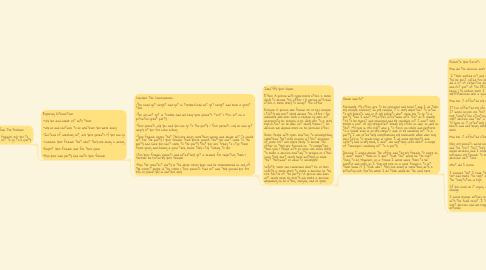
1. Define The Problem -Your friend/s ask you to sneak out to go to a party
1.1. Exploring Alternatives -Say yes and sneak out with them -Say no and continue to do whatever you were doing -Instead of sneaking out, ask your parents if you can go -Convince your friends that what they are doing is wrong -Report your friends and foil their plans -Plan your own party and invite your friends
1.1.1. Consider The Consequences -You could get caught and get in trouble/Could not get caught and have a great time -You will not get in trouble and will keep your parent's trust / Miss out on a potential great party. -Your parents say yes and you can go to the party / Your parents say no and get angry at you for even asking -Your friends agree that they are doing something wrong and decide not to sneak out for the party / your friends think you're jealous that you can't come to the party and since you can't come to the party that you are trying to stop them from going and having a good time, hence they stop talking to you -Tell your friends parents and potentially get a reward for reporting them / forever be hated by your friends -Plan the greatest party in the whole school year and be remembered as one of the coolest people in the school / Your parents find out and they ground you for life or punish you in another way
1.1.1.1. Identify your Values Ethics: A person with good moral ethics is more likely to decline this offer / A person with bad ethics is more likely to accept this offer Religion: A person who follows his or her religion strictly will most likely decline this offer / An individual who does have a religion or does not incorporate his religion in his daily life to a very high extent as he does not really follow it, his decision will depend more on his personal ethics. Goals: People with goals relating to accomplishing something that may require a strict discipline of some sort are more likely to decline this offer as they are focused on to completing their goal / People with no goals are more likely to make a decision relating to religion or ethics since they don't really have anything in mind that they want or need to accomplish. Safety: Some one concerned about his or hers safety is more likely to make a decision on the risk factor of the party / A person who does not really value his health will make a decision depending on his ethics, religion, and or goals.
1.1.1.1.1. Decide and Act Personally, My ethics are to be principled and honest and I do take my religion seriously. In my religion, it is very important to listen to my parents and so if my parents don't allow me to go to a party, then I won't. My ethics intertwine with that as I always try to be honest and principled and by sneaking out I won't only break a part of my religion but break my ethics as well. as well as that, My goal in life right now is to focus on school and perform to a grade level in all my subjects and so by sneaking out to a party, I am potentially compromising my homework which does help me stay up to grade level in school. I do value my health and safety and in my mind, I don't see anything safe about a couple of teenagers sneaking out to a party. Decision: I would decline the offer and tell my friends to carry on. I won't report them as I don't think that would be the right thing to do, However, as a friend I would warn them to be careful and safe as I feel my role as a good friend is to let them know if I think what they are doing in something with a potential risk factor which I do think would be the case here.

